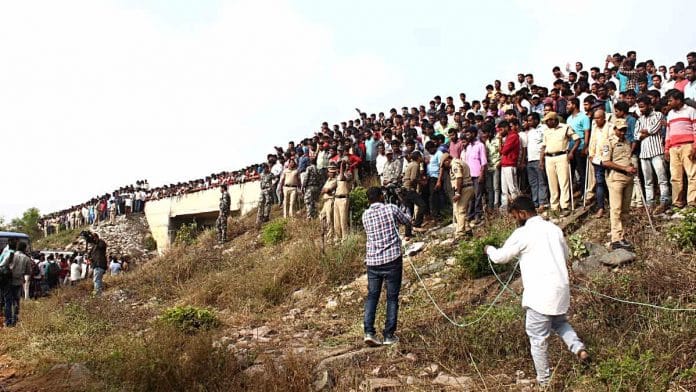New Delhi: Low conviction rate, tardy probes and prolonged trials result in 70 per cent rape cases remaining unattended in the judicial system and this, experts say, explains the public jubilation over the encounter killings of all four accused in the rape-and-murder of a Hyderabad veterinarian.
People applauding the police action shows a loss of faith in the existing systems, they said.
In the wee hours of Friday, the four accused in the rape-and-murder case of the 25-year-old woman veterinarian were killed in an exchange of fire with police when they were taken to the site of the offence to reconstruct the crime, the Hyderabad police said.
The accused, who were not handcuffed, were shot dead in “retaliatory” firing after they snatched weapons from police and opened fire in a bid to escape, Cyberabad Police Commissioner C V Sajjanar told reporters.
Hours after the incident, a chorus of opinions emerged, with some lauding the encounter killings and others demanding an inquiry into the matter.
Government data shows getting justice is a long-drawn-out process for rape victims.
According to the latest National Crime Records Bureau (NCRB) report, the conviction rate in rape cases in the country was as low as 32.2 per cent in 2017.
The total number of rape cases that went to trial in 2017 was 1,46,201 but only 5,822 of them resulted in conviction.
What is perhaps more worrisome is that while the conviction rate in rape cases has increased marginally in recent years, the charge-sheeting rate has gone down — which means cases are not going to court.
The charge-sheeting rate in rape cases dropped to 86.6 per cent in 2017 from 95.4 per cent in 2013, the NCRB report shows.
“Field-level staff of police need to be strengthened. They are mostly ill-equipped, inexperienced, power gets to their head and in most cases they are extremely corrupt.
“A sub-inspector is the highest-level officer who files a charge sheet, so one can imagine the quality of the content,” said Shilpi Jain, who was the defence lawyer in the Alwar rape case, wherein a foreign tourist was raped by Bitti Mohanty, the son former Odisha director general of police B B Mohanty.
Similarly, the prosecutors who deal with the cases at the district level are of low caliber and less driven, she said.
“All these factors make up a badly investigated case which results in low conviction (rate),” she added.
The Telangana police, who were in the line of fire till Thursday, suddenly became the poster boys of “speedy justice” Friday. They were showered with flower petals and chocolates by the public in Hyderabad.
Family of Nirbhaya, who died after being raped and brutalised by six persons in New Delhi in 2012, also hailed the encounter.
Dr Nimish G. Desai, director of the Institute of Human Behaviour and Allied Sciences (IHBAS), said none of the reactions expressed by sections of society surprised him.
These reactions, he said, come from a loss of faith in the existing systems and a belief that vigilantism is the only way out.
“Distress, frustration and helplessness of society makes people believe in vigilantism and makes them celebrate things like lynching. Immediate retribution is the basic streak of the society.
“Cops… when they become butt (target) of social ridicule and maligning, it makes them succumb to pressure and repeated attacks on social media and TV channels triggers them further. Cumulative collective angst makes people, even politicians, compromise objectivity. Their responses become emotional,” he explained.
Concerns, however, remain over legitimisation of what many have dubbed as “extra-judicial killings” that can set a “horrifying” precedent.
Many described the encounter as an instance of custodial killings carried out by “lynchers” in khaki.
Also read: Hyderabad ‘encounter’ of rape-murder accused chilling reminder of 2008 Warangal killings







Who benefits from the Low conviction rate, tardy probes and prolonged trials, it is always the accused. If at all a change is to brought about it will have to be done by the people in power, when a majority of them are accused will they ever make that change?
The rape allegation on a media boss may come to trial only after exhausting the all the legal avenues, we do not know what more ways will be discovered by the super lawyers to prolong that trail.
A basic investigation was delayed by approaching the courts at all levels only because the money was available.
This loss of faith in the system is dangerous, yesterday it was the rape accused , the time is not far when application of the same shortcut may apply to a politician , an industrialist or a media mogul. The people in and out of power do see that, hence the race for getting the disproportionate security.
The Judiciary needs to hang it’s head in shame.
Civilization ends when people or police indulge in illegal activities. Do we want a police state ?
Better a police state then a state without law and order and justice.
Police state means the end of any just order.
People may talk in favor or against this encounter method, but if Telangana police is given a free hand on it, that state will have the minimum cases of rape in the whole country. The only stipulation should be, that the “green signal” will be given by a very senior IPS officer and not the local constable or inspector.